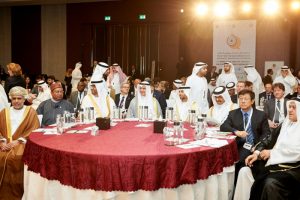The region’s energy ministers and industry leaders gathered at the third annual GCC Petroleum Media Forum at Abu Dhabi’s Rosewood Hotel, to discuss the ways in which the topic is covered by journalists, and the increasing influence of Big Data and social media.

The recent trials and tribulations of the energy industry have been comprehensively documented, not least in a region that is heavily dependent on oil and gas revenues. It’s no secret, however, that these stories are no longer being told in the ways they once were. Technology has transformed the media industry to the point where information is passed and markets are shifted at a rate never seen before.
December’s historic OPEC agreement saw members and non-member oil producers commit to cut their combined output by almost 1.8 million barrels per day, and a number of the key figures behind that deal were in attendance at the GCC Petroleum Media Forum’s third outing.
HE Suhail Al Mazrouei, minister of energy for the United Arab Emirates, stressed the importance of investing in new technology to ensure that the oil and gas industry continues to innovate amidst an oil price that has suffered in recent years.
When asked by if the GCC would face heavy job cuts in the face of an increasingly automated industry, Al Mazrouei was cagey. “It depends,” he told CNME. “In the manufacturing industry, it’s easier to say, because of robotics. However, when you’re dealing with high-pressures and high temperatures as in oil and gas, I think the level of jobs will not be significantly affected. We are trying to expand in creating more of a value chain here in Abu Dhabi, and investing throughout the value chain of the hydrocarbon and petrochemical industries and more derivatives of the petrochemical chain. That’s what we’re trying to do. We think that is going to create more jobs.”
Labelled as a drive for transparency, the UAE’s Ministry of Energy and OPEC have launched a new application for the organisations’ annual statistical bulletin. OPEC is also set to unveil a Big Data project, aimed at developing a comprehensive tool for analysing publicly available oil and gas data. This will see all industry data from 1960 onwards collated into a free-of-charge public platform.
Keynote speaker HE Dr Sultan Al Jaber, ADNOC CEO and UAE minister of state, meanwhile, discussed the ways in which technology is having an increasingly pervasive influence in the way information is spread. “Information is moving faster than ever before; social media is the fastest way for information and misinformation to be spread,” he said. “It’s important that we acknowledge the power of social media in order to build trust. It’s remarkable how easily a tweet can influence opinion.”
OPEC’s secretary general Mohammed Barkindo was the day’s third and most in-depth speaker, and as well as delving into a number of broader issues relating to energy, he too explored how technology is having a deep impact on the sector. “Despite a period of stagnation, the future is assured for the GCC, and Abu Dhabi has remained at the forefront of technology,” he said. Barkindo went on to discuss the ways in which the pace at which information is spread is having a deep impact on energy markets. “Nowadays, we have another information outlet that we simply cannot ignore – the face of social media – which continues to expand with each passing year. These are firmly established applications that are having a growing influence on all walks of society.”




